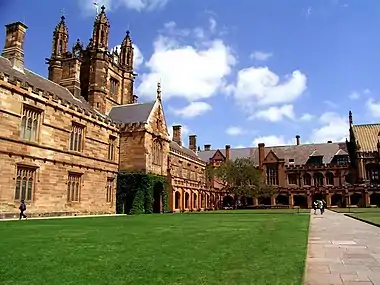Frontiers of Science was an illustrated comic strip created by Professor Stuart Butler of the School of Physics at the University of Sydney in collaboration with Robert Raymond, a documentary maker from the Australian Broadcasting Corporation (ABC) in 1961.[1] The artist was Andrea Bresciani.[2] After 1970 the comic was illustrated by David Emerson.[3]
It explained scientific concepts and recent research and in a 3 or 4 panel illustrated strip in an accessible and easily comprehensible way. The strip was syndicated to over 200 newspapers around the world for 25 years, from 1961 to 1987.[4] It was also published as soft cover books. As of 2011, it "retains the record of being the longest-running newspaper science comic strip in the world."[5]
The strips are archived at Rare Books and Special Collections in Fisher Library at the University of Sydney. The entire series is available for viewing online. [6][7]

References
- ↑ Australian Academy of Science Archived 2008-07-22 at the Wayback Machine Biographical Memoirs - Stuart Thomas Butler 1926-1982 . Accessed March 2008.
- ↑ Andrea Bresciani Archived 2007-11-03 at the Wayback Machine An Artist between Two Worlds By Giuseppe Trovato. Accessed March 2008.
- ↑ Holtz, Allan (2015). "Stripper's Guide: Obscurity of the Day: Frontiers of Science". Stripper's Guide. Retrieved 2019-04-26.
- ↑ Leach, Joan; Burns, Maureen (2009). "Frontiers of Science Communication | Issues Magazine". www.issuesmagazine.com.au. Retrieved 2019-04-26.
- ↑ Burns, Maureen; Leach, Joan (2011-09-01). "Science as an extra dividend: Frontiers of Science". International Journal of Cultural Studies. 14 (5): 531–546. doi:10.1177/1367877910382190. ISSN 1367-8779. S2CID 145566058.
- ↑ "Frontiers of Science". The University of Sydney. 2019.
- ↑ Slezak, Michael (2009-10-28). "When science took a long, light look at itself". The Sydney Morning Herald. Retrieved 2019-04-26.
External links
- Drifting Through Inner Space Ocean deep exploration explained in 5 cartoon strips c late 1960s - at NASA website - Accessed July 2006.
- University of Sydney Outreach projects, Frontiers of Science, - Accessed July 2006.
- Frontiers of Science Digital Collections, University of Sydney - Accessed April 2019.
